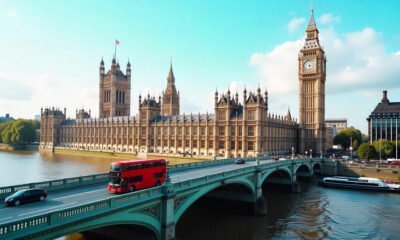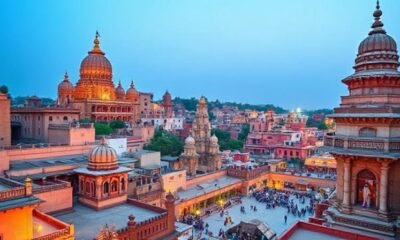Travel Guides & Articles
Shivaji College Hosts New Seminar Honoring Birsa Munda’s Legacy, Shaping the Future of Tribal Empowerment and Tourism In India

Published on
August 12, 2025 |
Recently, Shivaji College, University of Delhi, organized a seminar “Life, Leadership and Legacy of Birsa Munda: Inspiring National Spirit and Tribal Empowerment.” Sponsored by the Indian Council of Social Science Research (ICSSR) under the Vidya Vistar Scheme, the seminar focused on the pivotal works of Birsa Munda, the tribal freedom fighter and indigenous leader known for his relentless struggle on the indigenous people’s rights, culture, and environmental conservation.
Birsa Munda’s Legacy: A Catalyst for Tribal Empowerment and Tourism
The seminar, attended by scholars, policymakers, and students, explored Birsa Munda’s ongoing influence in shaping India’s approach to tribal empowerment, heritage preservation, and sustainable development. Keynote speakers underscored the importance of incorporating Birsa Munda’s vision into modern-day policies, especially in the areas of tribal rights, social reforms, and ecological protection. His legacy not only continues to inspire the empowerment of tribal communities but also opens the door for developing tourism that prioritizes environmental sustainability and cultural respect.
Hon’ble Shri Durgadas Uikey, Union Minister of State for Tribal Affairs, attended as the chief guest, highlighting the government’s efforts to honor the contributions of tribal communities, including the commemoration of Janjatiya Gaurav Diwas on November 15. His remarks focused on how the recognition of tribal heritage impacts national unity and enriches the country’s cultural tourism offerings.
Tribal Heritage and Sustainable Tourism: A Growing Focus
Professor Prasanna K. Samal, the Birsa Munda Chair Professor at Indira Gandhi National Tribal University, provided an in-depth reflection on Birsa Munda’s diverse role in society as a freedom fighter, spiritual leader, social reformer, and conservationist. His keynote highlighted how tribal communities in India, often seen as stewards of nature and cultural traditions, could significantly enhance India’s sustainable tourism landscape. By promoting eco-tourism and cultural tourism in tribal areas, India can showcase the richness of its indigenous heritage while simultaneously supporting local economies and preserving the environment.
Tribal communities are increasingly recognized not just for their historical significance but for their contemporary role in promoting eco-tourism. The seminar emphasized that sustainable travel initiatives focused on tribal areas can provide tourists with authentic cultural experiences while supporting the growth of the local economy.
Exploring the Role of Tribal Communities in Modern Tourism
A special session led by Professor S. M. Patnaik, Director of the Centre for Tribal Studies at the University of Delhi, illustrated the deep-rooted connection between tribal communities and nature. Through examples like the Bonda community, he emphasized how tribal practices maintain ecological harmony. This presentation underscored the potential for tribal communities to guide modern travelers toward understanding the balance between culture and nature.
Professor Iyatta Maharana Uprety, Principal of Sikkim Government College, also connected tribal heritage with tourism. She discussed how greater engagement with tribal culture can foster environmental awareness and tourism practices rooted in ecological sustainability. Birsa Munda’s advocacy for self-reliance and tribal land rights continues to be highly relevant in the context of promoting tourism that respects indigenous ways of life and prioritizes environmental preservation.
The Economic Impact of Tribal Heritage in Travel and Tourism
The seminar’s discussions touched upon the economic benefits of integrating tribal heritage into India’s tourism offerings. When managed responsibly, tribal tourism can create a sustainable income stream for remote and marginalized communities while simultaneously preserving their traditional lifestyles. This growing focus on tribal tourism can lead to the development of unique travel experiences that are both educational and enriching for tourists, while benefiting the communities involved.
Professor K. Ratnabali, Dean of Academic Affairs at the University of Delhi, wrapped up the seminar by emphasizing the importance of documenting and preserving tribal culture. She noted that integrating tribal knowledge into tourism policies can help safeguard sacred spaces and foster a more inclusive tourism sector. Recognizing Birsa Munda’s enduring legacy, she called for further investments in research and education that would support sustainable and socially responsible tourism across India.
Shivaji College’s Commitment to Tribal Empowerment and Tourism
Shivaji College’s role in fostering academic research on traditional knowledge and ethnomedicine was also highlighted during the seminar. The college’s initiative to include discussions about tribal empowerment, heritage, and sustainable tourism aligns with the National Education Policy (NEP), which advocates for the preservation and promotion of local cultures. By hosting such seminars, Shivaji College provides a platform for students and researchers to engage in meaningful dialogue about the intersection of culture, ecology, and tourism.
Conclusion: A Sustainable Future for Tribal Tourism
The seminar ended with yet another appeal to incorporate tribal empowerment within the framework of tourism in India. India can transform its tourism into a more respectful and inclusive industry by weaving ancient indigenous wisdom and their intimate ties to nature into its tourism structure. The event also highlighted the need to link travelers with tribal heritage while promoting eco-tourism that helps local people and conserves the natural and cultural heritage of India.
(Photo: Shivaji College)
Travel Guides & Articles
Air India Express starts direct flight operations from Doon to Bengaluru, ETTravelWorld

Air India Express on Monday started its direct flight operations from Dehradun to Bengaluru with Chief Minister Pushkar Singh Dhami flagging off the new air service at the Jolly Grant Airport.
The Chief Minister described it as a significant milestone in the overall development of the state and the expansion of air connectivity.
“The commencement of Air India Express services from Dehradun marks a significant achievement in civil aviation for our state. Better connectivity with Bengaluru will greatly boost tourism, trade, and investment opportunities in Uttarakhand,” he said.
Direct air service between Dehradun and Bengaluru by Air India Express would also be a great facility for the youth, entrepreneurs, IT professionals, students, and tourists of Uttarakhand, he said.
“Bengaluru is the tech capital of the country and thousands of youths from Uttarakhand are engaged there in education, services, and startups. Now, they will have a more convenient, timely, and safe travel option to visit their home state,” the Chief Minister said.
“It will also strengthen connectivity for students, professionals, and entrepreneurs with one of India’s most dynamic cities. We welcome Air India Express and look forward to the positive impact this connectivity will have on our people and economy,” Dhami said.
In recent years, the state government has taken several major decisions – from policy reforms to infrastructure development – to strengthen air connectivity, Dhami said.
“We are delighted to commence direct flight operations from Dehradun to our largest domestic hub, Bengaluru. This shows the rapid expansion of our network,” Air India Express MD Aloke Singh said.
“With over 115 aircraft now in our fleet, we are building a stronger and more accessible network that reflects the aspirations of modern India,” he said.
Travel Guides & Articles
Adani Enterprises to construct Kedarnath ropeway project, to cut travel time to 36 minutes

Ahmedabad (Gujarat) [India] September 15 (ANI): Adani Enterprises Ltd (AEL), the flagship company of the Adani Group, on Monday said it has received a Letter of Award (LoA) from the National Highways Logistics Management Ltd (NHLML) to develop the ropeway project between Sonprayag and Kedarnath in Uttarakhand.
It will invest Rs 4,081 crore in the project, to be executed by AEL’s Roads, Metro, Rail and Water (RMRW) division. The 12.9 km ropeway is expected to transform one of India’s most challenging pilgrimages by reducing the journey time from the current 8 to 9-hour trek to just 36 minutes, the company said in a release.
Once completed, the ropeway will be capable of carrying 1,800 passengers per hour per direction, easing the arduous journey for lakhs of devotees visiting the Kedarnath shrine every year. Kedarnath attracts around 20 lakh pilgrims annually, and the new ropeway is projected to not only make the travel safer and faster but also improve the overall pilgrim experience.
The project falls under the Government of India’s National Ropeways Development Programme, ‘Parvatmala and will be developed on a Public-Private Partnership (PPP) mode on a revenue-share basis with NHLML. According to the company, construction is estimated to take six years, after which AEL will operate the ropeway for 29 years.
“The Kedarnath ropeway is more than an engineering project – it is a bridge between devotion and modern infrastructure,” said Gautam Adani, Chairman of the Adani Group, as per the release.
The release further stated, “By making this sacred journey safer, faster and more accessible, we honour the faith of millions while creating new opportunities for Uttarakhand’s people through our partnership with NHLML and the Government of Uttarakhand. This prestigious project reflects our commitment to building infrastructure that not only serves the nation but also uplifts its people.”
Apart from providing improved connectivity, the project is expected to generate direct and indirect employment opportunities and significantly boost tourism in the region.
He further noted that the project reflects Adani Group’s commitment to building infrastructure that not only strengthens the nation but also uplifts communities.
Adani Enterprises, which entered the roads and highways sector in 2018, has steadily expanded its portfolio under the RMRW division. Currently, it has 14 projects across Hybrid Annuity Model (HAM), Build-Operate-Transfer (BOT), and Toll-Operate-Transfer (TOT) modes, covering more than 5,000 lane kilometres.
The Kedarnath ropeway project is being viewed as a landmark step that will combine technological expertise with spiritual significance, providing pilgrims with a safer and more comfortable passage while opening up new economic avenues for the state of Uttarakhand. (ANI)
(This content is sourced from a syndicated feed and is published as received. The Tribune assumes no responsibility or liability for its accuracy, completeness, or content.)
Travel Guides & Articles
From Luxury To Value Travel: How Indian Tourists Are Redefining Holidays | Culture News

Indians are spending big on travel. An survey by Thomas Cook (India) and group company SOTC Travel published earlier this year saw 85% of respondents mentioning their plan to travel more frequently in 2025, doubling or tripling the number of holidays they take. The survey also showed 84% tourists intending to increase their travel budget by 20–50%, with around 18% planning a significant rise. But it’s not just travel, but how they travel that’s also undergoing sea change.
According to industry experts, Indian consumers are spending more on experiences than possessions. The narrative is no longer about luxury versus value – it is about luxury and value, coexisting, colliding, and reshaping the contours of India’s hospitality and aviation economy.
According to experts, India’s luxury hotel market touched an estimated ₹72,000 crore in 2024 and is projected to grow at a brisk 14% CAGR through 2030. At the same time, mid-market and independent accommodations still account for nearly 58% of the hospitality share, supported by a surging middle class and Gen Z road-trippers seeking “value-plus” experiences. “It’s not a binary choice between Oberoi and a budget lodge, it’s coexistence,” observes Sahil Pandita, CEO and Founder, Promiller Group.
Luxury As Lifestyle: Personalisation Beyond Price
Luxury travel is also witnessing a signficant change. The affluent traveller no longer equates luxury to chandeliers and marble lobbies; it is measured in time saved, privacy assured, and experiences tailored to the individual. “Luxury travel today is no longer just about opulence or extravagance; it’s about crafting experiences that are seamless, personal, and entirely tailored to the traveller’s lifestyle,” says Justinas Bulka, CEO of KlasJet. The appetite for curated indulgence, from private aviation with flexible schedules to hotels that anticipate needs before they are expressed, has created a market where “the ultimate indulgence is a journey that respects both comfort and efficiency.”
Increasingly, travellers are refusing to accept a trade-off between indulgence and conscience. Sustainability, once a peripheral demand, has become central to the definition of “premium.” “We are observing that today’s traveller is no longer choosing between luxury and value, they want both in a meaningful way,” says Suprabhath Roy Chowdhury, General Manager, voco Jim Corbett.
Also Read: Travel Bucket List: 10 Incredible Places To Visit In India To Satisfy Your Wanderlust – In Pics
Value Travel: Key Factor Behind India’s Travel Boom
While luxury travel is getting redefined, value travel remains the core of India’s travel industry. According to Pandita, “Middle-class and Gen Z travellers are flying regionally, road-tripping, and choosing unique, independent stays, not just big brands.” In fact, independent hotels continue to dominate share even as chains expand, signalling that travellers still seek discovery, local flavour, and affordability. This is not about compromise; it’s about maximising value in ways that enrich the experience.
-

 Business2 weeks ago
Business2 weeks agoThe Guardian view on Trump and the Fed: independence is no substitute for accountability | Editorial
-
Tools & Platforms1 month ago
Building Trust in Military AI Starts with Opening the Black Box – War on the Rocks
-

 Ethics & Policy2 months ago
Ethics & Policy2 months agoSDAIA Supports Saudi Arabia’s Leadership in Shaping Global AI Ethics, Policy, and Research – وكالة الأنباء السعودية
-

 Events & Conferences4 months ago
Events & Conferences4 months agoJourney to 1000 models: Scaling Instagram’s recommendation system
-

 Jobs & Careers3 months ago
Jobs & Careers3 months agoMumbai-based Perplexity Alternative Has 60k+ Users Without Funding
-

 Podcasts & Talks2 months ago
Podcasts & Talks2 months agoHappy 4th of July! 🎆 Made with Veo 3 in Gemini
-

 Education3 months ago
Education3 months agoVEX Robotics launches AI-powered classroom robotics system
-

 Education2 months ago
Education2 months agoMacron says UK and France have duty to tackle illegal migration ‘with humanity, solidarity and firmness’ – UK politics live | Politics
-

 Podcasts & Talks2 months ago
Podcasts & Talks2 months agoOpenAI 🤝 @teamganassi
-

 Funding & Business3 months ago
Funding & Business3 months agoKayak and Expedia race to build AI travel agents that turn social posts into itineraries





















